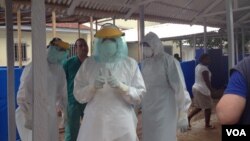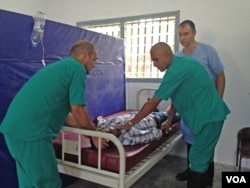A Cuban doctor working in Sierra Leone has contracted Ebola and is being flown to Geneva for treatment. The doctor is one of 165 medical personnel Cuba sent to Sierra Leone to help fight the Ebola epidemic. The infection occurred despite intensive training the Cubans after arriving in Freetown.
The training for the Cuban medical staff in Freetown was organized through the World Health Organization (WHO). One goal was to reduce the dangers to the medical workers.
A WHO spokesperson in Freetown, Winnie Romeril, said there will be a thorough investigation of how the doctor contracted the deadly virus.
“Accidental exposures happen in every country in the world. They are particularly hazardous when dealing with a pathogen like Ebola," said Romeril. "We’re going to look into what happened here, and if it’s a systemic problem, we’ll look to change that. If there’s something we can do at the front end to better prepare, we’ll do that as well, but right now we don’t know what happened with this individual.”
Rigorous training
The training the Cubans receive in Sierra Leone is twofold. They practice the proper use of personal protective equipment, or PPE. And to simulate experiences the medical staff may face, Ebola survivors reenact scenes of what they actually went through as Ebola patients.
Benon Tumwebeze, a trainer for the Cuban teams in Sierra Leone, said, “We want health workers to get insight, that if you get a patient -- how do you handle them? So we present cases Ebola patients normally go through like vomiting, diarrhea, some of them are confused. So we have such cases and each case has a learning point.”
Some of the Cubans are working in Kerry Town, just outside Freetown, where an Ebola treatment center was built. Others are still in training.
Cuban medical worker Jose Benito Garcia said it is Cuba’s duty to come to West Africa and stop the worst Ebola outbreak in history.
“It’s our tradition in Cuba," said Garcia, "that we stand in solidarity with places that don’t have resources to handle crisis like this. Sierra Leone is one of those places.”
Garcia added that the additional training on site through the WHO is helpful because it is hard to know what to expect from Ebola patients.
Yoel Bernal Ferrera has a similar view of the training. “From a professional point of view, it’s important for me because it is a new experience -- but the most important is that we can help people who need our help.”
Ebola survivor Mohamed Turay is glad to help in the training by playing the role of an Ebola patient.
"It is important, because I don’t want any [more] members of my family or country to lose their life, so this is important that they [medical workers] are able to manage these cases, they are difficult cases,” said Turay.
Exacting requirements
The medical staff also had training in the use of personal protection equipment back in Cuba.
The most challenging aspect is putting on and taking off the gear, and dealing with the heat while wearing PPE, said Cuban nurse Julio Ramirez, who just started work at the Kerry Town treatment center. The slightest slip could result in an Ebola infection.
“It’s very hot, the PPE’s, to be inside the ward, no more than maybe 40-45 minutes,” said Ramirez.
There are three Cuban teams in Sierra Leone, and a total of 256 medical professionals from Cuba in West Africa to help stop the spread of Ebola.
More than 5,000 people have died during this outbreak among more than 14,400 confirmed cases worldwide.





